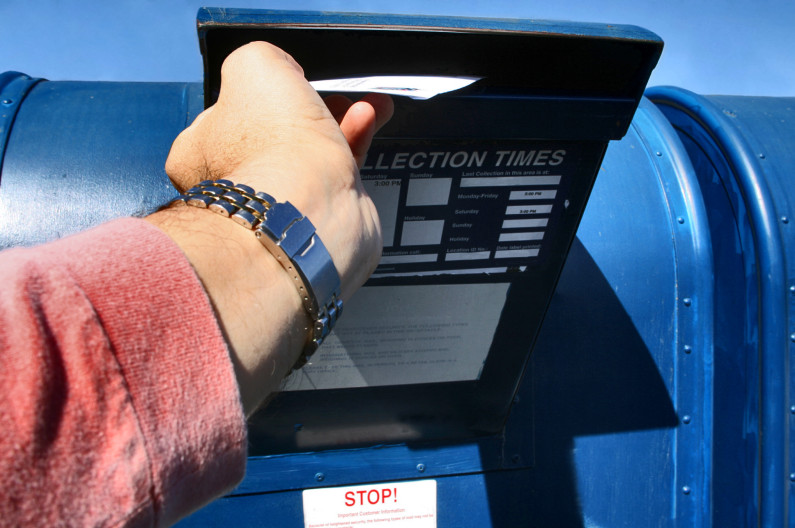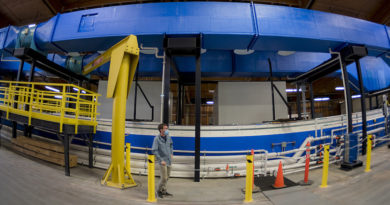Daily Business Report-Nov. 20, 2018
Much of the census data today is collected as it had been throughout history — through face-to-face contact. (Credit: San Diego State University)
Research suggests a better, cheaper
way to conduct the U.S. Census
By Suzanne Finch |SDSU
For more than 200 years, the federal government relied on door-to-door visits to each residence in the United States to conduct the census every 10 years. Beginning in 1960, the U.S. Census Bureau came to rely primarily on mailing surveys to households, though government employees still knock on doors of those who are unable or unwilling to return their forms.
And while technology has altered almost everything since 1960, the method for collecting census data remains virtually unchanged.
With this in mind, a group of researchers from San Diego State University and the University of Oklahoma has proposed that the census could be completed using data from government and private industry sources such as the IRS, financial institutions, the Department of Motor Vehicles and consumer credit bureaus—no mail required.
The team found it would be possible to collect the data much faster and more accurately than the current systems of mailed paper surveys and face-to-face interaction allow. Additionally, they found that existing data could provide more comprehensive financial information—including where people are living in poverty—than the traditional census measurements.
Research team members are: SDSU alumnus James Kelly; SDSU management information systems (MIS) professors Murray Jennex and Kaveh Abhari; director of SDSU’s Visualization Center, Eric Frost; and Alexandra Durcikova, MIS professor from the University of Oklahoma.
The team noted two hurdles to implementing a census via data sharing: privacy issues and convincing the agencies involved to share their information. Their research determined the issue of privacy could be addressed by stripping out all personally identifiable information (PII) such as names, social security numbers, email address and other identifiers not required for census analysis.
“Stripping out the PII is critical since cyber criminals are savvy enough to bypass even the most sophisticated data security measures,” Jennex said. “Creating a data system that accepts only non-identifying data required by the census—number of people in a household, household income, etc.—will protect privacy since it isn’t in the system anyway.”
The biggest challenge
More difficult is the potential development of a system that allows agencies and institutions to share their data.
“Government agencies tend to keep their information in silos, even though it would be of great benefit to move it to an open data system,” Jennex said.
Where census data might show a household of two adults and one child, Jennex said, the IRS data could show whether the adults are married and if they are comingling funds.
This data, along with supporting data defining medical expenses, geographical location and property ownership, could then be used to determine if the one or both of the adults and their children are living in poverty, Jennex said.
“Using data in this manner would help government agencies create anti-poverty programs that are targeted toward people based on their location, household size, income and other factors,” he said. “It could also be used help to track those anti-poverty programs and their effectiveness.”
While the researchers believe a secured, open-source system to collect census data would be more efficient, they acknowledge that barriers to implementation may be too great to overcome for the time being. This means the 2020 census will be administered just as it was in 1950, when Dwight Eisenhower was president.
SDG&E wants out of the
electricity-buying business
Voice of San Diego
San Diego Gas & Electric is exploring ways to leave the electricity-buying business. As the city of San Diego makes moves to start its own power agency, possibly along with other cities in the region, SDG&E “has asked lawmakers to introduce legislation that would let SDG&E reduce its role – while also pushing the state to enter the energy market in a big way,” Ry Rivard of Voice of San Diego reports.
It has written a draft bill that Sen. Ben Hueso could carry once the state Legislature reconvenes.
It might sound like a big hit to SDG&E’s bottom line, but the company would continue to deliver power to local customers, even if San Diego does for what’s known as a CCA to buy power for residents instead of the company.
“A well-run utility can make a steady profit from delivering power,” Rivard notes.
SDG&E’s proposal would require the state to buy out its long-term power contracts, and it’s not clear what state agency would step up to pay for that.
Cubic taps Leonardo DRS to
supply F-35 training subsystems
GovCon Wire
Cubic’s global defense unit has selected Leonardo DRS to provide over 500 internal subsystems of a combat training platform for the F-35 aircraft.
The effort would globally bring the number of F-35 units equipped with the P5 Combat Training System to over 1,000, Leonardo DRS said.
The P5CTS is designed to record real-time mission data of training for air-to-air, air-to-ground and surface-to-air combat.
Leonardo will deliver the internal subsystems to Cubic over a four-year period to help support lots 12 through 14 of Lockheed Martin’s F-35 production.
P5CTS’ internal subsystems are installed inside the aircraft unlike the complementary P5CTS pods that are externally mounted on an aircraft’s wings.

PR agency launches workshop
series on ‘PR in the Digital Age’
(W)right On Communications Inc. will host “PR in the Digital Age,” a series of free one-hour workshops for its client partners and registered guests in San Diego, Los Angeles and Orange County.
The San Diego workshop is Nov. 30 from 8 to 9 a.m. at its La Jolla office, Suite G100, 1200 Prospect St. The Los Angeles workshop is on Jan. 24 from noon to 1 p.m. at its downtown Los Angeles office, 35th floor, 555 W. 5th Street. The Orange County workshop is on Feb. 20 from noon to 1 p.m. at 3200 Park Center Drive in Costa Mesa.
Pre-registration is required and can be completed online at wrightoncomm.com/pr-in-the-digital-age/.
Led by agency President and Founder Julie Wright, “PR in the Digital Age” is an introduction to integrated communications that shows how various media come together to drive results and enable measurement. Attendees will learn how to measure and improve the return on their organization’s PR investment and to amplify the impact of their current PR efforts. The workshops are designed for small groups and intended to be interactive with actionable outcomes attendees can begin implementing right away.
Future presentations will feature content on multimedia design, media pitching best practices, social media advertising, crisis communications, presentation skills and more with a new topic each quarter.
“Our agency team has been meeting monthly for years to discuss and explore best practices and new trends in communications,” said Wright. “We’re now bringing this material to our client partners and the corporate communications community to help elevate the conversation around public relations.”
For more information or to request a workshop for your organization, contact info@wrightoncomm.com or (858) 886-7900.
Petco and Express Scripts team
to offer home delivery of pet medicines
San Diego-based Petco and Express Scripts, a health care company focused on delivering personalized solutions to improve health care, announced a new strategic alliance that will enable millions of pet parents to order and receive pet medicines from the comfort and convenience of home.
Pet parents spend more than $8 billion annually on prescription and over-the-counter (OTC) medications for their animals. Petco now offers pet parents access to the pet prescriptions and OTC medications their pets need online via petco.com and petcoach.co for delivery directly to their front door, all Powered by Express Scripts.
“Our commitment to helping pet parents take complete care of the pets they love is the core of everything we do at Petco,” said Brock Weatherup, chief innovation and digital experience officer for Petco. “By leveraging the industry-leading technology and fulfillment processes Express Scripts already has in place, we’re able to offer pet parents an easier, more affordable, faster and more convenient way to get the medicines their pets need.”
BLT Enterprises acquires Vista
manufacturing facility for $31.15 million
BLT Enterprises has acquired a 221,660 square-foot industrial manufacturing and warehousing facility in Vista for $31.15 million. The building is currently occupied by DENSO Wireless Systems America Inc., a supplier of advanced automotive technology, systems and components, and also the seller in this transaction. DENSO built the building in 1997.
“The property was developed with high-technology industrial design characteristics,” said Bernard Huberman, founder and president of BLT Enterprises. “The exterior features cutting-edge modern architecture while the interior boasts extremely high-quality and fully upgraded manufacturing and warehouse space.”



